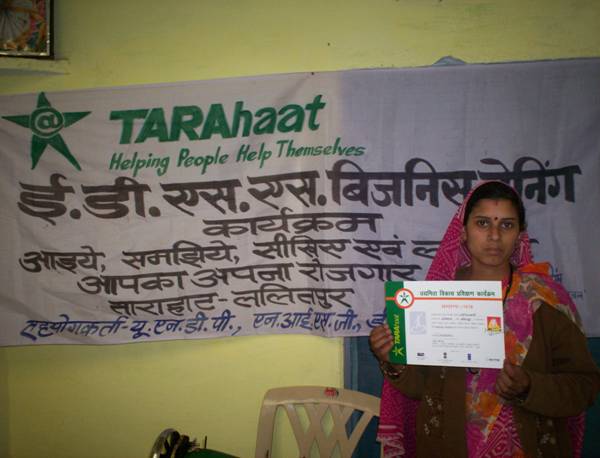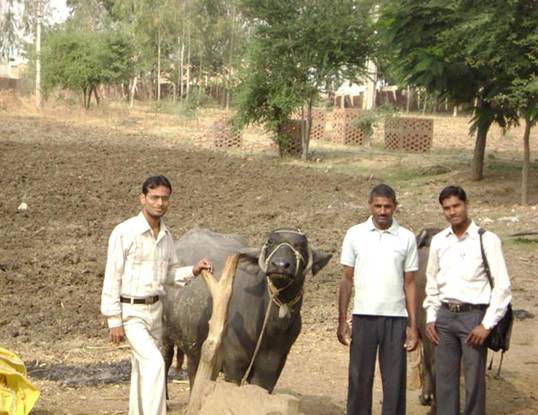|
ICT and Rural Entrepreneurship
In
keeping with its mandate to empower rural and marginalised communities
through Information and Communication Technology (ICT) with the purpose
of enabling them to integrate with the mainstream economy, TARAhaat’s
ICT-enabled Enterprise Development and Support Services (EDSS) is an
exciting step forward. EDSS focuses on providing entrepreneurship
opportunities to youth, women and self-help groups through the rapidly
expanding network of TARAkendras, TARAhaat’s rural
business-cum-community centres. EDSS components add critical dimension
to the scope of services provided by TARAhaat and the
development/experiment in ICT-enabled services for rural India!
EDSS! Sounds Good,
But What’s it all About?
EDSS is an innovative experiment in addressing a critical need in rural
India’s employment. The unique and comprehensive ICT-based EDSS supports
aspiring and established entrepreneurs through every element of the
business life cycle.
There are certain primary components of the service:
• Enterprise packages provide both technical training in a specific type
of business, imparting the fundamentals of how to manage the enterprise
and also imparting customised concepts o n
how to establish market and financial linkages. n
how to establish market and financial linkages.
• An Entrepreneurship Development Programme is customised for the
background and life experience of rural citizens, to enhance their
understanding of how to set up a business, and plan and manage the same.
• An Ask the Expert and an online FAQ service provides ongoing business
support, all in the local languages and in the local idiom.
Additionally, an outreach programme to identify potential entrepreneurs
is currently being rigorously field tested to ensure that the EDS
products benefit the maximum number of individuals.
Local Consultants
(TARAgurus)
Local consultants, known as TARAgurus, represent the virtual teacher
physically, assist the entrepreneurs with on-site problems, and provide
standard services such as project proposal corrections, creating
linkages, etc.
Integration with
Backend Processes
To meet the objective of the EDS programme, it is mandatory to identify
and negotiate partnerships and alliances with the government, and
corporate and civil society organisations. Several avenues for building
such alliances have been explored, and selected alliances have been
either consummated or are in final stages of negotiation. Some of the
principal ones are the Regional Rural Bank, Nehru Yuva Kendra Sangathan,
Regional Employment Exchange Bureau, Uttar Pradesh Udyog Mandal, Central
Bank, District Industries Centre, Khadi and Village Industries
Commission, NABARD, etc.
Yes! ICT is
working!!!
The best part of our experience with EDSS is, yes, it is working. All
the earlier doubts have been laid to rest. Indeed, it is contributing
more than what was expected in terms of quality consistency, learning
and adaptability. The complete transformation can be witnessed through
glowing testimonials and entrepreneurs along with the increasing demand
of the aspirants to join the ICT-based entrepreneurial training
programmes.
With more then 100 successful entrepreneurs and 700 changed lives, of
which 36% were women, EDSS has contributed significantly, playing a
vital role in their rural peoples’ improved living standard and local
economy.
Outcome of EDSS
Services
EDSS has helped many entrepreneurs in transforming their dreams into
reality, ranging from both farm- and non farm-based enterprises
including poultry farms, dairies, grocery shops, computer centres,
pickle factories, candle-making units, beauty parlours, hotels,
eateries, cycle repairing shops, etc.
Entrepreneur
Development Programmes for TARA Akshar Trained SHGs
Either a large segment of India’s population is unemployed or it is not
in a position to participate in the growth process and share the
benefits just because it is illiterate. Unemployment is an equally
serious problem for individuals, especially women from poor families who
tend to have little or no education. The consequence is either
unemployment or low productivity jobs with very little pay, keeping the
people and their families trapped in the vicious cycle of poverty.
Without any concerted action, illiteracy and unemployment can impede
growth and development of the country. Many Initiatives have been
executed. However, the major limitation of existing programmes is the
availability of only one part of the solution, which is either a
literacy programme or a rural entrepre-neurship programme. Additionally,
most of the literacy programmes are ineffective and too long in
duration, and most of the entrepreneurship programmes lack facilitation
of meaningful and viable enterprise options as also the inadequacy of
market, technical and financial linkages. Most important is the need for
capacity building support throughout an enterprises’ life cycle, a
facility that is largely nonexistent. In order to address this
challenge, in association with the OXFAM Foundation, DA has successfully
implemented one phase of TARA Akshar and EDP together. For the first
time, both these components are integrated. Here, TARA Akshar teaches
the illiterates to read and write in a remarkable 30 days and EDP trains
the unemployed on key business skills. With the OXFAM Foundation, we
have trained 100 SHG women and the second phase of this initiative will
take place soon.

Web Support
Services
During the EDSS implementation, we came across several challenges and
constraints. We approached Hewlett Packard with a proposal detailing the
possible solutions for the makeover of project. We also presented
Hewlett Packard with some major challenges:
• Setting up of an online Ask-the-Expert service: Currently, a local
domain expert advises the EDSS-trained entrepreneurs at each critical
stage of their business life cycle. This expert has to travel
extensively to provide support to these enterprises. Also, it is
difficult to maintain the high quality of advice in the remote areas
where DA is operational.
• Scaling up the programme on a national scale: Since EDSS is heavily
ICT based, it requires laptops and projectors to impart training. Due to
resource crunch, DA has not been able to scale up the programme.
The various components of the HP technology grant helped EDSS set up an
effective online Ask-the-Expert service. It will further help the
entrepreneurs access expert advice on an anytime anywhere basis. The
scanner, located at an approachable TARA kendra, can be used by
entrepreneurs to scan letters/queries in their local languages. Experts
in cities can then review these scanned documents and this advice can be
printed using a printer and delivered to the entrepreneurs. Laptops,
along with wireless access points, will also provide these entrepreneurs
access to the world of information at their doorsteps using the
Internet. Thus, the best practices followed by similar micro enterprises
elsewhere can be replicated in these enterprises.
Currently, EDSS uses two laptops to train 25-30 potential entrepreneurs
every month. The HP grant will help in scaling up the programme at least
four folds and help the expansion of EDSS programme in other areas too.
It is expected that within three months, the exercise will take solid
shape. The availability of additional laptops will provide DA the
flexibility to offer simultaneous trainings in new areas.
q
Praveen
Manikpuri
pmanikpuri@tarahaat.com
Back to Contents
|
 n
how to establish market and financial linkages.
n
how to establish market and financial linkages.